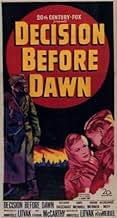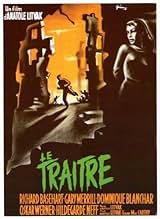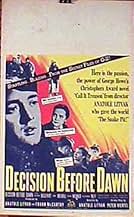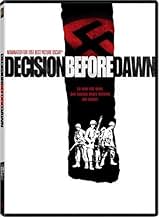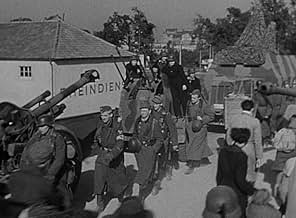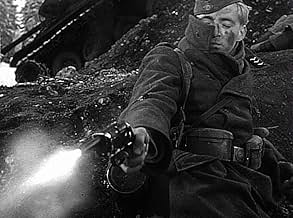IMDb RATING
7.2/10
3.2K
YOUR RATING
As the US Army approaches Nazi Germany, they recruit German prisoners of war to spy behind German lines.As the US Army approaches Nazi Germany, they recruit German prisoners of war to spy behind German lines.As the US Army approaches Nazi Germany, they recruit German prisoners of war to spy behind German lines.
- Nominated for 2 Oscars
- 1 win & 4 nominations total
Hildegard Knef
- Hilde
- (as Hildegarde Neff)
Wilfried Seyferth
- Heinz Scholtz - SS Man
- (as Wilfried Seyfert)
Robert Freitag
- Sgt. Paul Richter
- (as Robert Freytag)
Harold Benedict
- Lt. Pete Gevers
- (as H.L. Benedict S/Sgt. USAF)
H.W. Briggs
- Self
- (as H.W. Briggs Sgt. USA)
D.G. Devine
- Lt. Rennick's Driver
- (as D.G. Devine Cpl. USAF)
L.E. Dixon
- Self
- (as L.E. Dixon Maj. USA)
B.L. Hendrickson
- Self
- (as B.L. Hendrickson T/Sgt. USA)
Featured reviews
10B24
Occasionally I rate a film high for personal and sentimental reasons. In this case I am compelled by objective facts to add in the light of greater perspective that I consider this one of the best war movies of all time.
In the first place, the acting is superb. The casting is flawless. The direction is taut, as is the editing. It is filmed in black and white, as it would have to be even today if someone wanted to try a remake. The locations and sets are authentic to a "T." The story itself follows faithfully the text of a book I read as a child (before I saw the film, in fact).
Moreover, I consider it an act of bravery on the part of the film's producers even to begin a project like this so soon after the end of World War II, when passions against the Germans were still running high and mere caricatures of that nation's common people remained the standard for the day (and for years to come).
Oskar Werner in the main role was a brilliant choice, and veterans Richard Basehart and Gary Merrill provide ample evidence that casting proceeded on a basis of resolute excellence and authenticity. I am still blown away by revisiting the "Romantic Road" in Germany and thinking how this movie defined and continued to define for me how recent and ancient history converged along that path.
I cannot praise it enough.
In the first place, the acting is superb. The casting is flawless. The direction is taut, as is the editing. It is filmed in black and white, as it would have to be even today if someone wanted to try a remake. The locations and sets are authentic to a "T." The story itself follows faithfully the text of a book I read as a child (before I saw the film, in fact).
Moreover, I consider it an act of bravery on the part of the film's producers even to begin a project like this so soon after the end of World War II, when passions against the Germans were still running high and mere caricatures of that nation's common people remained the standard for the day (and for years to come).
Oskar Werner in the main role was a brilliant choice, and veterans Richard Basehart and Gary Merrill provide ample evidence that casting proceeded on a basis of resolute excellence and authenticity. I am still blown away by revisiting the "Romantic Road" in Germany and thinking how this movie defined and continued to define for me how recent and ancient history converged along that path.
I cannot praise it enough.
As American forces approach Germany near the end of World War II, it becomes crucial for them to get an idea of the Germans' capacity to resist. In order to do that, they recruit spies from among German POWs, train them and send them into Germany to gather information. This is somewhat of an unusual film about a subject that, as far as I know, had never been dealt with before or since (the movie is based on fact; American military intelligence did indeed use German POWs as spies). The location filming helps the picture greatly, as the war had only been over for a few years and Germany still hadn't rebuilt yet. Performances are universally top notch, notably Oskar Werner as a young German soldier code-named Happy who volunteers to return as a spy, and especially Hans Christian Blech as Happy's tough, opportunistic, and not entirely trustworthy partner. There are some nail-biting moments, notably aboard a train when Happy and his partner come under scrutiny by a suspicious Gestapo agent. The film has a tough, gritty, dangerous look that is totally atypical of the usual 20th Century Fox gloss, and is all the better for it. Gary Merrill as the tough American officer in charge of the operation, and Richard Basehart as an American agent sent in to accompany the two German spies, also turn in first-rate performances, and director Anatole Litvak keeps the film full of twists and surprises, but it's Oskar Werner's show, and he is up to it. An excellent film and one to put on your must-see list.
I have seen this film on cable several times. Some of the scenes that are supposed to be in Wurzburg are actually in Munich. The chase scene in the rubble towards the end of the film was near the old Bavarian "Rezidence" or Royal palace that the Wittelsbach family lived in near the old town area of Munich. I recognized the Kriegsmuseum building which is now the seat of the Bavarian state government. Other than that I really enjoyed the film. Having read countless stories about the demise of the once mighty Wehrmacht this film was, to me, accurate in its portrayal of soldiers beaten down and waiting for the inevitable end. Werner has been one of my favorite actors. His performances in "The Spy who came in from the Cold", "Fahrenheit 451" are very good.
Having served in the US Army-Europe in Germany it was easy to see that this work was an accurate depiction of the world as Germans saw it in those years. Going to the IMDb database confirmed that it was filmed in Wurzberg, a city I visited many times. One can not help but wonder what memories and nightmares came back to life for the German people in this movie, or the ones who viewed it, or even witnessed the movie being made. The film is so very realistic in script, acting, and setting that some must have almost thought WWII was alive again. For those that lived through WWII in that country it must have seemed as if those days were repeating themselves. Every detail of this movie is accurate as far as I could tell. It does not employ overused stereotypes, no action heroes, no earth shaking grand and glorious finale, it simply depicts a period of time in all its' tragedy and irony in a most realistic manner. This work deserves more praise and exposure than it has received. A must see for every WWII researcher and historian.
A taut story, first-rate acting, and a compelling subject make this film worth seeing.
Espionage/spying is a tricky subject, but "Decision Before Dawn" handles it brilliantly. No flash, no Mata Haris, no absurd coincidences. Weaving human drama and the grim realism of war, this film is that rare gem that manages to teach without preaching.
Among the superb performances is our hero Happy, played with just the right blend of suspense and humanity by Oskar Werner. Happy (an ironic name given to him by his American overseers) is torn between love of his native land and his duty to what is right. Werner walks this tightrope better than most I've seen.
In the end, however, it's the script that is the true gem of the film. Peter Viertel is a master story teller, with such great screenplays as "Saboteur" and "The Hard Way" to his credit. Viertel, with a story by author George Howe, weaves an intricate, but not confusing, narrative of war and devotion and duty. He's one of the few _writers_ I look for when I check out "On TV This Week" on IMDB.
Espionage/spying is a tricky subject, but "Decision Before Dawn" handles it brilliantly. No flash, no Mata Haris, no absurd coincidences. Weaving human drama and the grim realism of war, this film is that rare gem that manages to teach without preaching.
Among the superb performances is our hero Happy, played with just the right blend of suspense and humanity by Oskar Werner. Happy (an ironic name given to him by his American overseers) is torn between love of his native land and his duty to what is right. Werner walks this tightrope better than most I've seen.
In the end, however, it's the script that is the true gem of the film. Peter Viertel is a master story teller, with such great screenplays as "Saboteur" and "The Hard Way" to his credit. Viertel, with a story by author George Howe, weaves an intricate, but not confusing, narrative of war and devotion and duty. He's one of the few _writers_ I look for when I check out "On TV This Week" on IMDB.
Did you know
- TriviaOne of the first films after World War II to portray the German people--outside of the Nazi regime--in a sympathetic light.
- GoofsKarl is mistakenly called a corporal. The Luftwaffe uniform that he wears both in the US POW cage and while back in Germany has the rank insignia of an "Obergefreiter", specifically three winged emblems on the collar patches, plain shoulder straps and two chevrons on his left sleeve. Also when the list is checked for his name at the bridge the rank is written down as 'Gfr' (gefreiter) The ranks of Gefreiter, Obergefreiter and Stabsgefreiter (all which were partially identified by chevrons on the sleeve) were not NCOs and had no command authority over other soldiers. They were simply grades of seniority and would be more equivalent to Private First Class (PFC) in the US military. The German rank that is the closest equivalent to Corporal is Unteroffizer. Also, Karl is wearing the medical badge on his right sleeve; Luftwaffe enlisted medical personnel wore the badge on the left sleeve, while Wehrmacht (army) wore it on the right.
- Quotes
Lt. Dick Rennick: [Intro narration] Of all the questions left unanswered by the last war, and probably any war, one comes back constantly to my mind. Why does a spy risk his life... for what possible reason? If the spy wins, he's ignored. If he loses, he's shot.
- ConnectionsReferenced in That Girl: Decision Before Dawn (1968)
- SoundtracksAch, wie ist' möglich dann (Treue Liebe)
(uncredited)
Written by Friedrich Kücken (1827)
- How long is Decision Before Dawn?Powered by Alexa
Details
- Release date
- Countries of origin
- Languages
- Also known as
- Decisión al amanecer
- Filming locations
- Production companies
- See more company credits at IMDbPro
- Runtime1 hour 59 minutes
- Color
- Aspect ratio
- 1.37 : 1
Contribute to this page
Suggest an edit or add missing content



